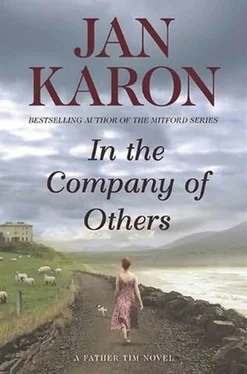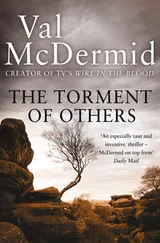‘Any harm done to it?’
‘None we could see.’
‘The Garda,’ said Anna. ‘The uproar it will bring. Dear God.’
‘Yes,’ he said.
‘I can’t believe it.’ Anna shook her head, took a deep breath. ‘It’s hard to consider the good news for thinking how Liam will feel. This black betrayal will cap it all. Does Seamus know?’
‘He does,’ he said. ‘He’ll mention it to no one. It will be a hard thing for Mrs. Conor.’ The upheaval of a police investigation, inevitable. The news of one son stealing from another, inevitable. The extra drain on Evelyn Conor’s diminished physical resources, inevitable.
‘I’m sorry for her,’ said Anna. ‘I want you to know that. I’m not completely coldhearted.’ She looked at her hands in her lap. ‘I must think of how to tell Liam-he seems happier just now. I can hardly keep up with all that comes at us-’t is a battering ram at our door.’
He thought of Fintan O’Donnell and the fruit spoons; how the doctor had quietly removed them from the thief’s possession and returned them to his own, with no word spoken. This would be different.
‘I’ve heard fiddle music a couple of times,’ he said, ‘as if it were coming from this room.’
‘Yes. I share it now with Bella. Things feel better, if only a little. Thank you both for your kindness, your patience with her, with all of us.’
‘Thank you for your patience with us,’ he said.
‘Soon you’ll be leaving. It seems you’ve been with us a very long time.’
He couldn’t help smiling. ‘We have been with you a very long time.’
‘I shall hate to see you go.’
‘We will hate to go,’ said Cynthia.
‘If you change your mind, you can have your room through next week.’
‘Thanks,’ he said. ‘We must get home to our son.’
He wanted to tell Anna that William was not Liam’s father, should she have any lingering question. But Liam had talked to him in confidence, and the need to relieve Anna was not his concern.
He stopped with Cynthia in the library and looked around-at the fine bookcases and worn rug, the chairs with their silent history of sitters from every realm, the fireplace with its eternal flame. ‘I’ll never forget this room.’ He put his arm around her. ‘Did you mean it about hating to go?’
She looked at him, thoughtful. ‘Yes.’ They hoped to be ready when Feeney gave the word.
‘Has Pud seen the suitcases?’
‘He has.’
They had no energies left to chat up the Sweeneys and the author and niece at the social hour, nor any joie de vivre for dinner downstairs. They took it in their room, withered as weeds.
She put on the declining robe; he donned pajamas and, raising a glass of fairly decent port, opened the journal to their bookmarks and read aloud.
January 1863
After bitter days of solitude & sickness at Cathair Mohr, the snow melts fast & we have seen three patients. I wonder at the low number; they are uneasy & tell me there are rumours abroad.
I ride out on Adam, dodging the worst of the mud.
Inside her door, I remove my heavy coat & hang it on a peg. Her red hen perching on the other chair gives me a menacing look.
I pull up a stool. What are they saying, Rose?
They’re sayin’ ye’ve a lad sick with Cholera at your place.
Who is saying it?
O’Leary got th’ word passin’, he didn’t call it th’ Cholera to me, but ’t was turned into Cholera by th’ time it went round. They say Balfour is comin’ to your door with such as th’ Health Board.
I had thought the rumour started when Keegan went four days ago to Mullaghmore to pronounce the lad too ill with food poisoning to travel, & met Padraigin coming this way saying the lad’s mother is in Hospital. The poor woman suffers the same evil symptoms we are wrestling with here but Keegan swears he stuck to his story of food poison.
How is th’ lad? she says.
Frail as any feather, we do all we can. Tis the typhoid fever, but you must swear to say nothing.
She dips her chin, affirming her honor to me.
Tis passed to another through feces or urine or vomit, I say, & no need to worry for he is quarantined & I come to ye clean.
She puffs her pipe, nods. I am pleased to see a makeshift pie sits warming on her hob.
And you, Rose? Are ye well in this wether?
Aye, but for th’ Rheumatics.
She holds up her hands, displays her gnarly fingers.
Keep them warm, I say. Is there anything ye need?
Mutton, she replies.
Ye’ll have it, I say.
I go to the peg & pull on my heavy coat.
Bring him here when he’s stout again, she says. I’ll boil ’im an egg from Cliona.
Stout again! My heart leaps. I salute her.
Bail ó Dhia ort, I say with my little Irish.
Bail ó Dhia is Muire dhuit, she says.
Cliona has not moved from her perch.
I return home, brooding with an unnamed anxiety. There is Balfour’s untidy carriage, fair covered with mud. Balfour & two men-both English-are coming down the steps of the front portico, Keegan stands on the top step, arms folded, looking sour. Caitlin stands in the open doorway, a statue of marble in her white nurse’s apron. I do not dismount.
We have searched your house, sir, says Balfour, the Great Boar Hog in Trousers.
I say nothing.
We were informed you have Contagion here, says one of the men.
I see by C’s expression that they have not discovered the lad.
I trust you are pleased with your findings, I say.
I rein Adam about, mud flying. At the carriage house, I find I am trembling as if with the ague.
It happened that Jessie had been sweeping out the upper floor & looked down to see Balfour’s carriage in the lane. She alarmed the house so that Keegan & C got the lad well-wrapped & down the stairs to the quarantine room in good time.
Jessie cleared the table by his bed, chucked it all into a pillow casing & hid it in the laundry. C stuffed his wee dab of clothes behind her bureau. Fiona’s sour humour came to marvelous use-she met the men in the hall & forced them to remove their muddy boots!-this action giving Keegan & C time to roll the bookcase away & get the lad into the room.
As she tells me this, C is trembling as I had done.
We put him on the cot, she says, & covered him with the blankets. I asked him not to cry out whatever he did and he did not. They searched the house-what terrifying & wicked little men they were, & yet so very stupid-seeming in their sock feet. If men were robbed of boots with their dangerous heels, wars would cease.
She clings to me. We must keep the lad there, she says, for they will be back, I can feel it.
What did you tell them, I say.
Twas a poor job, but the best I could muster. I said a relative of his had come for the boy & we know nothing of his circumstances. I said he had recovered from what appeared to be food poisoning & was well & able when he left us.
They asked about Padraigin & the rest?
Yes.
What did you tell them?
The truth, she said. That they live in Mullaghmore, but I am not certain where.
I go down to him carrying a slab of heated stone wrapped in a scrap of linen. In the cold room, my breath is vapor. I am brought low by the smallness of him beneath the blankets & the heat of his head in this punishing fever.
I place the wrapped stone beneath the covers at the foot of the cot & pull the little stool from under the table & sit by him.
Lad, I say.
He opens his eyes to me. I see the tribulation of the world in but eight years of living.
You are safe, I say. You will be strong again. You will make a fine Surgeon.
I am babbling like an idjit, tears streaming. I turn my face from him & make this promise aloud in the desolate room-With God’s help, we shall see a nasty thing fixed back to a good thing.
Читать дальше












